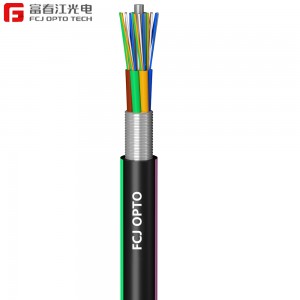GYTA Manufacturer's Multi Core Optical Fiber Cable
Product Main Parameters
| Specification | Details |
|---|---|
| Fiber Count | 2 to 216 |
| Cable Diameter | 4.9 to 16.9 mm |
| Cable Weight | 79 to 330 kg/km |
| Tensile Strength | 600-1000 N |
| Crush Resistance | 300 N/100mm |
| Bending Radius | 10D/20D |
| Temperature Range | -40℃ to 70℃ |
Common Product Specifications
| Optical Characteristics | Details |
|---|---|
| Attenuation @ 850nm | ≤3.0 dB/km |
| Attenuation @ 1300nm | ≤1.0 dB/km |
| Attenuation @ 1310nm | ≤0.36 dB/km |
| Attenuation @ 1550nm | ≤0.22 dB/km |
Product Manufacturing Process
The manufacturing process of GYTA Optical Fiber Cable involves meticulous steps to ensure quality and reliability. Initially, high-purity optical preforms are fabricated using techniques like Modified Chemical Vapor Deposition (MCVD). These preforms are then drawn into fibers under controlled conditions, maintaining the necessary tensile strength and optical properties. Subsequently, the fibers are coated to enhance protection against environmental factors. The manufacturing process also incorporates rigorous testing phases to meet international standards, ensuring each cable's performance aligns with its design. As a manufacturer, we remain committed to innovation, adhering to advancements detailed in authoritative research.
Product Application Scenarios
GYTA Optical Fiber Cables are versatile and integral to various industries. In telecommunications, they serve as the backbone for internet infrastructure, supporting high-speed data transfer for end-users. In the medical field, they enable accurate imaging and diagnostics through endoscopic equipment. Industrial applications include machinery monitoring, offering precision and efficiency without direct contact. The defense sector utilizes optical cables for secure communications and sensor integration. With increasing demand for high-bandwidth and low-latency connections, the deployment of advanced optical fiber technologies continues to expand.
Product After-Sales Service
Our manufacturer's commitment extends beyond purchase, offering comprehensive after-sales support. We provide technical assistance, warranty services, and guidance for installation and maintenance, ensuring optimal product performance.
Product Transportation
To guarantee the integrity of our GYTA Optical Fiber Cables during transit, we employ robust packaging solutions. Each shipment undergoes careful handling and tracking, ensuring timely and secure delivery to clients worldwide.
Product Advantages
- High bandwidth and data transmission capability
- Minimal signal loss over long distances
- Immunity to electromagnetic interference
- Enhanced security against signal tapping
- Lightweight design facilitates easy installation
Product FAQ
- Q1: What environments are suitable for GYTA Optical Fiber Cables? A1: As a manufacturer, we design these cables for diverse environments, including urban and rural telecom infrastructures, withstanding extreme temperature variations.
- Q2: How do I ensure the longevity of the optical fiber cable? A2: Regular inspections and adherence to installation guidelines recommended by the manufacturer will optimize cable longevity and performance.
- Q3: Are GYTA cables compatible with existing telecom networks? A3: Our Optical Fiber Cables are engineered for seamless integration across standard network setups, enhancing connectivity and speed.
- Q4: What is the warranty period for GYTA cables? A4: The manufacturer provides a comprehensive warranty period that covers defects, ensuring reliable service and quality assurance.
- Q5: Can GYTA Optical Fiber Cables be customized? A5: Yes, as a manufacturer, we offer customization to meet specific client needs, including fiber count and cable length variations.
- Q6: What safety measures are incorporated in the cable design? A6: Our cables include redundant waterproofing and protective layers that prevent damage from environmental and physical stressors.
- Q7: How do GYTA cables handle harsh weather conditions? A7: As a leading manufacturer, our design incorporates durable materials and coatings to resist UV exposure and water ingress.
- Q8: What standards do GYTA cables comply with? A8: Our Optical Fiber Cables meet international standards such as IEC 60794-1, ensuring quality and reliability.
- Q9: What are the advantages of using optical fibers over copper cables? A9: Optical fibers provide higher data transmission speed, lower attenuation, and better resistance to electromagnetic interference than copper cables.
- Q10: How soon can we expect delivery after placing an order? A10: Delivery timelines are manufacturer-dependent, typically within 4-6 weeks, subject to order size and shipping destination.
Product Hot Topics
- High-Speed Internet Demand: With the rise in demand for high-speed internet, GYTA Optical Fiber Cables position themselves as a critical infrastructure component, offering unmatched data transfer rates crucial for modern bandwidth needs.
- Smart City Integration: Optical Fiber Cables are essential for smart city projects. They facilitate real-time data exchange, supporting smart traffic systems, security surveillance, and IoT applications, enhancing urban efficiency.
- Optical Fiber in Medical Tech: The precision of optical fibers has transformed medical technologies, enabling groundbreaking advancements in minimally invasive procedures and real-time diagnostics, benefiting patient outcomes significantly.
- Environmental Sustainability: With an increasing focus on sustainability, optical fibers offer a greener alternative. By reducing energy consumption and enabling smart solutions, they contribute positively to environmental conservation efforts.
- Advancements in 5G Networks: The deployment of 5G networks relies heavily on optical fiber infrastructure for its high-speed and low-latency features, making it integral to next-generation telecommunication advancements.
- Remote Work Expansion: As remote work continues to grow, robust internet connectivity becomes crucial. GYTA Optical Fiber Cables support the seamless operation of home offices, ensuring uninterrupted communication and productivity.
- Optical Fiber Maintenance Best Practices: Regular maintenance of fiber optic networks maximizes performance and longevity. Understanding best practices from manufacturers can save costs and enhance efficiency.
- Future of Telecommunications: Optical fibers are at the forefront of telecommunications innovation, paving the way for future developments in telecommunication networks and infrastructure expansion globally.
- Security in Data Transmission: The inherent security advantages of optical fibers make them a preferred choice for secure data transmission, crucial for industries handling sensitive information.
- Industry 4.0 and Optical Cables: The transition to Industry 4.0 benefits from the high-speed connectivity offered by optical fiber cables, facilitating automated and data-intensive manufacturing processes.
Image Description
There is no picture description for this product
